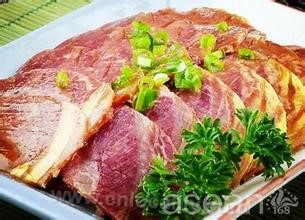welcomeSpecialty Foods Products!

Origin: Xinji, Hebei, China. History: It is said that during the Daoguang period of the Qing Dynasty, a butcher named Tian lived in Diantuying Village, xinji city (Shulu County) and moved to Liushuangying near Xinji to deal in salted donkey meat. Practice and eating method: soak the donkey meat to be cooked in cold water every afternoon, and change the water every hour until the water is clear and the meat is white, then put it in a boiling pot, soak it for about ten minutes, then change the water and add pepper, aniseed and fennel to cook it with strong fire. When the meat is cooked, press the lid with stones, then simmer for one night, and then take out the cooked salty donkey meat the next morning, cut it into strips along with the meat, and then Features: Fine and complete selection of materials, meticulous production, red and delicious, soft but not rotten, fragrant but not greasy, fresh but not fishy. Nutritional value: Every 100 grams of donkey meat contains 27 grams of protein, which is a high-protein and low-fat food with low fat content. Donkey meat also contains carbohydrates, calcium, phosphorus, iron and various amino acids needed by human body. According to the Compendium of Materia Medica, donkey meat is warm in nature and has the functions of invigorating qi and nourishing blood, nourishing essence and strengthening yang, nourishing yin and tonifying kidney, and benefiting lung.
Reprinted with attribution:
https://cnlocality.com/(Chinese Specialty Products)
other
consult:(+86)13225231905